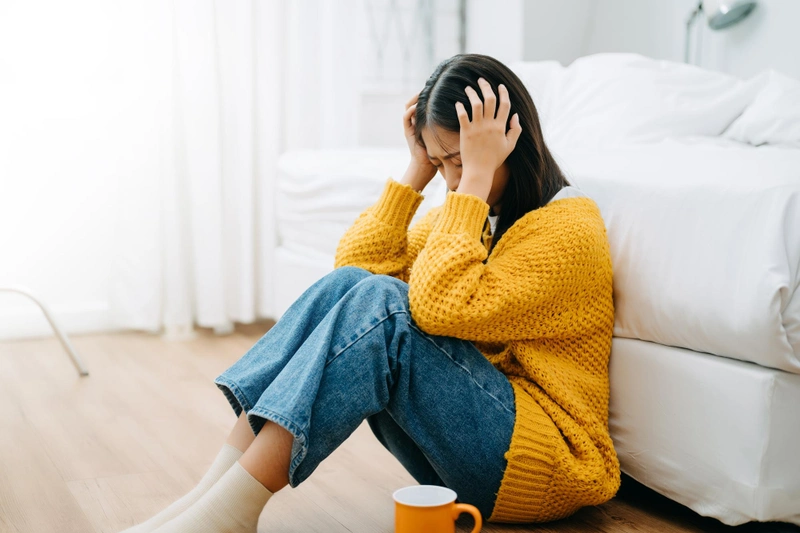- Published on: Nov 29, 2023
- 2 minute read
- By: Secondmedic Expert
Painsomnia: Understanding The Sleep Thief - Symptoms, Causes, And Treatment
Introduction
Quality sleep is integral to our overall health, yet many battle with a relentless sleep disruptor called "painsomnia". This term encapsulates the struggle of insomnia rooted in chronic pain. In this comprehensive guide, we'll delve into the nuances of painsomnia, exploring its symptoms, underlying causes, and practical steps toward alleviating its impact on sleep quality.
What Exactly is Painsomnia?
Painsomnia refers to the intricate relationship between chronic pain and disrupted sleep. Individuals dealing with conditions like arthritis, fibromyalgia, migraines, or persistent back pain often find themselves trapped in a cycle where pain disrupts sleep, and in turn, insufficient sleep heightens the pain, resulting in a frustrating cycle of sleeplessness and discomfort.
Recognizing Painsomnia Symptoms
Identifying signs of painsomnia is pivotal for effective management. Common symptoms include:
- Difficulty initiating sleep despite feeling fatigued
- Frequent awakenings throughout the night
- Sleep that feels non-restorative
- Daytime fatigue, irritability, and impaired concentration
- Increased pain intensity due to inadequate sleep
Root Causes of Painsomnia
Understanding the root causes is crucial in devising strategies to manage and mitigate its effects. Several contributing factors include:
Chronic Pain Conditions
Underlying chronic pain, whether from arthritis, neuropathy, or injuries, significantly disrupts sleep patterns. The discomfort experienced can make it challenging to find a comfortable sleeping position or maintain uninterrupted sleep.
Psychological Factors
Emotional stress, anxiety, or depression often accompany chronic pain conditions, intensifying the perception of pain and disrupting sleep patterns, creating a cyclic relationship between pain and sleeplessness.
Medication Impacts
Certain medications used for pain management may have side effects that interfere with sleep. Discussing any sleep disturbances with a healthcare provider can lead to adjustments in medication timing or exploration of alternative options.
Actionable Strategies for Coping and Treatment
Managing painsomnia necessitates a multifaceted approach addressing both pain and associated sleep disturbances. Here are actionable strategies and treatments:
Embracing Effective Pain Management Techniques
Exploring varied pain management strategies, including physical therapy, acupuncture, massage, or prescribed medications aimed at reducing pain intensity, can significantly improve sleep quality.
Adopting Good Sleep Hygiene Practices
Implementing good sleep hygiene practices such as maintaining a consistent sleep schedule, establishing a relaxing bedtime routine, and optimizing the sleep environment can notably enhance sleep quality.
Engaging in Cognitive Behavioral Therapy for Insomnia (CBT-I)
CBT-I, a structured program targeting thoughts and behaviors contributing to sleep disturbances, has shown promise in managing painsomnia by addressing negative thought patterns and promoting healthier sleep habits.
Reviewing Medication Impact
Open dialogue with healthcare professionals about sleep disturbances can lead to adjustments in medication timing or dosage to minimize their impact on sleep while effectively managing pain.
Exploring Mind-Body Therapies
Mindfulness meditation, yoga, or deep breathing exercises can aid in stress reduction, promote relaxation, and contribute to improved sleep quality for individuals dealing with painsomnia.
Conclusion: Taking Action Towards Better Sleep Quality
Painsomnia poses a significant challenge to one's quality of life, emphasizing the importance of addressing both underlying pain and sleep disruptions. Employing a holistic approach combining pain management strategies, sleep hygiene practices, and psychological interventions is key to effectively managing painsomnia and enhancing sleep quality.
By seeking guidance from healthcare professionals and embracing healthy lifestyle changes, individuals can navigate the journey toward reclaiming restful and rejuvenating sleep despite the challenges of painsomnia.
Remember, managing painsomnia is a process that may require patience and persistence to identify the most effective combination of strategies. Do not hesitate to consult doctor and support when needed.
Read FAQs
A. Painsomnia refers to the challenging experience of insomnia triggered by chronic pain. It's a condition where individuals find it difficult to fall asleep or stay asleep due to persistent discomfort caused by chronic pain conditions like arthritis, fibromyalgia, or migraines.
A. Painsomnia is distinguished from typical insomnia by its association with chronic pain. While both conditions involve sleep disturbances, painsomnia specifically relates to disrupted sleep caused by underlying chronic pain conditions, leading to a cycle where pain disrupts sleep and insufficient sleep intensifies pain.
A. Several strategies can help manage painsomnia. These include exploring effective pain management techniques such as physical therapy or prescribed medications, adopting good sleep hygiene practices, engaging in cognitive behavioral therapy for insomnia (CBT-I), reviewing medication impacts, and exploring mind-body therapies like mindfulness meditation or yoga.
A. Yes, emotional stress, anxiety, or depression often accompany chronic pain conditions, contributing to the intensity of pain perception and disrupting sleep patterns. Addressing these psychological factors through counseling, stress reduction techniques, or therapy can positively impact painsomnia management.
A. Yes, seeking guidance from healthcare professionals is crucial for effective management of painsomnia. They can provide personalized advice, suggest suitable treatments, adjust medications, and recommend lifestyle changes tailored to an individual's specific condition and needs.
Our Services
Request A Callback
Recent Posts
Hidden Sodium in Indian Foods – Why It Matters
Jun 13,2025










